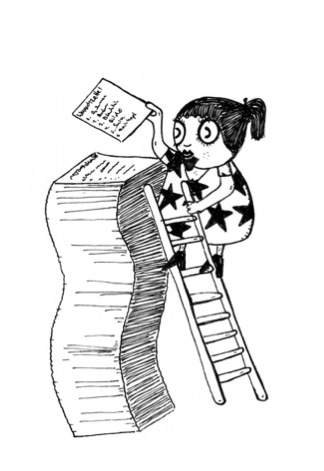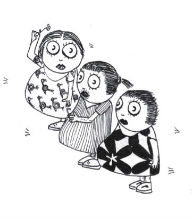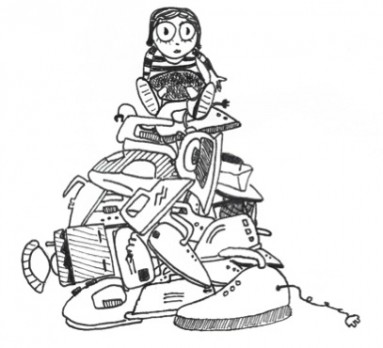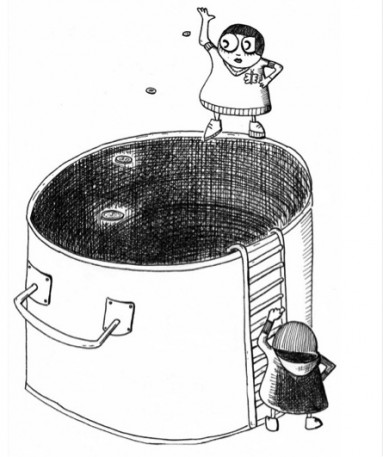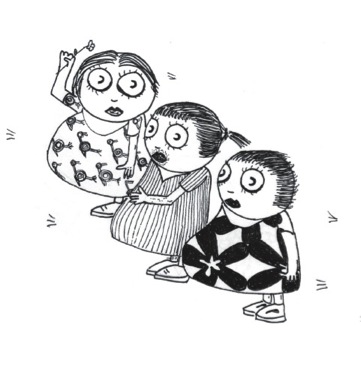The following are excerpts from the upcoming English translation of Bini Adamczak's Communism for Children, a fable of capitalist dystopia and communist revolution. Translated from the German by Sophie Lewis and Jacob Blumenfeld.
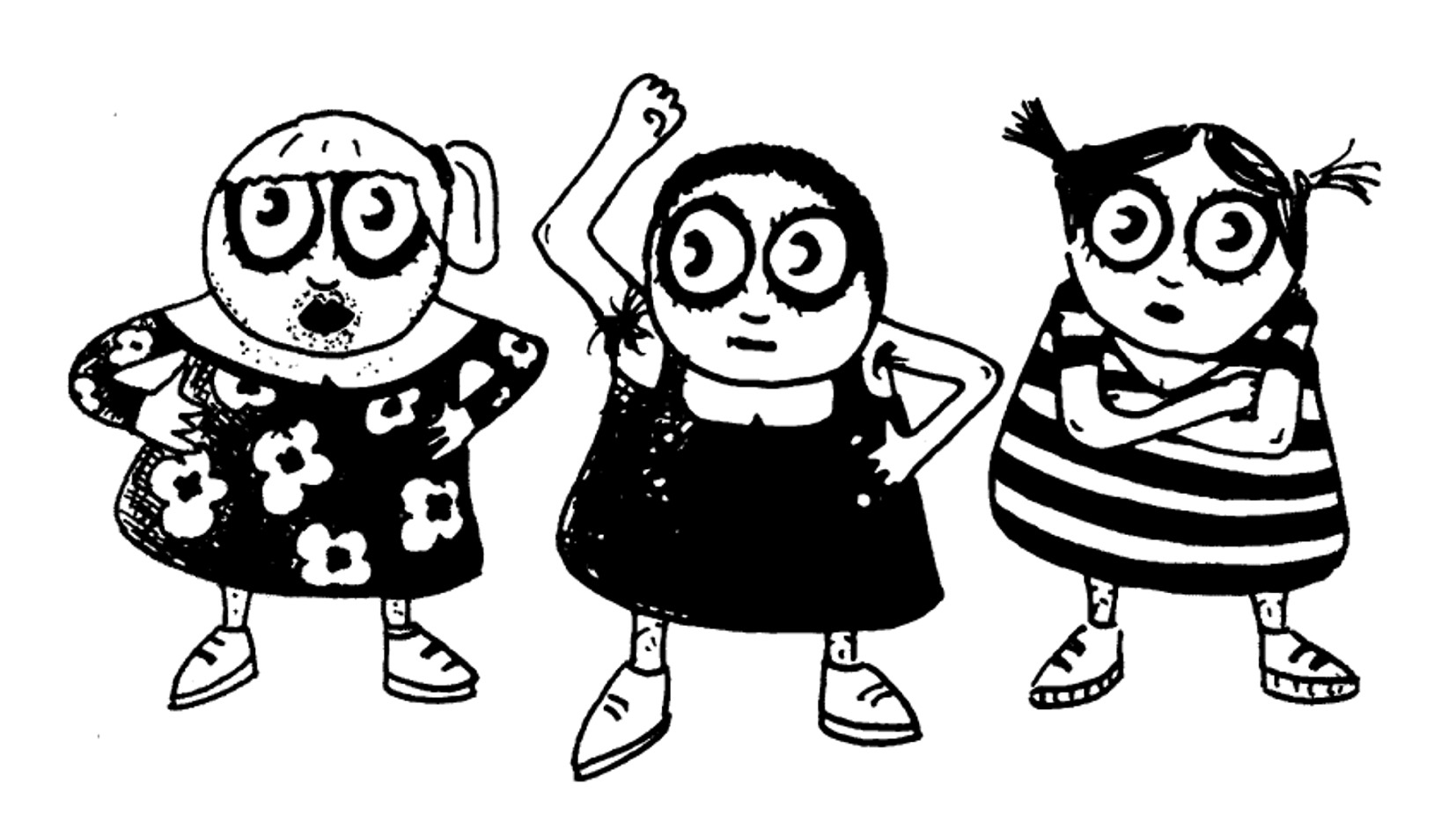
What is Crisis?
The next time our protagonist factory goes to market, it brings twice as many steam irons, because it reckons to itself: “The other factory is bankrupt: fantastic! Now, all the people who used to buy their irons there will come to me instead. I’ll have twice as many customers, so I’ll need twice as many irons.” But what should our factory discover on arrival at the “irons-and-MORE!” marketplace? That almost nobody wants to buy irons anymore—at all. Because what happened on our street, between our factory and the other factory, also happened everywhere. In the world there are countless factories: not just those that produce irons, but also those that produce pistols. And now that many people can only go to the movies once a week, or even not at all, they don’t feel like buying irons. Instead, they buy TVs and DVD-players so they can watch movies at home. It’s not the same, but the people tell themselves “better than nothing, eh.”
Still, some of them aren’t simply unable to go to the movies anymore—they don’t have enough to eat. And so they buy tomatoes and eggs to throw at the factory walls, because that seems like a priority. The factory, though, has no use for tomatoes, since it’s an iron factory and not so much in the business of manufacturing tomato sauce. It’s stuck with making and selling irons. As we know, it has brought twice as many irons to market as usual. Today, however, it can’t sell twice as many irons, and can only get itself into twice as much debt. Sure enough, our factory goes bankrupt as well. And it fires all the iron-making people.
Now there’s nothing left. No factories, no machines, no sheet-metal or nails, and no iron-making people at all. But there are vast piles of irons that nobody needs. Although no terrible disaster has occurred—no earthquake, no war, no visit from the pope—all of a sudden, everyone is sitting around, bored stiff and hungry to boot. Some try to turn the irons into marmalade, but this proves mostly fruitless. “We’re in a real mess now,” the people say. “If only we hadn’t listened to that factory!” And one person adds: “You know what? It’s all these things! We make them in the first place in order for them to serve us, but then, they start getting uppity and we have to serve them. Now we’re stuck hanging out with all these damn irons!” And another one, someone really angry, adds: “I knew it! I knew it! It’s these stupid objects, it’s this god-damned ob- ... ob-… objectification! I knew it!”
So everybody sits down around the irons to have a good long think about capitalism. They conclude that the mess really is all capitalism’s fault. “Well! That certainly didn’t work out well,” they reflect. “Not only did capitalism make us all unhappy, it was, in fact, constantly going wrong.” “And another thing,” someone comments loudly, “we’ve had capitalism far too long a time—about 200-500 years—surely we’ve had enough now. It’s time for some relief. What we want is something new.” “Yes! Something new, but what?” asks somebody else. At this point there is a long silence, as the people turn it over in their minds. Each one of them would love to know the answer to this question.
Suddenly, it comes to them. “COMMUNISM!” they exclaim. “Obviously! Since communism is the society that does away with all the evils people suffer under capitalism. Let’s go for communism!” “Oh gosh,” the people groan, “of course!” And they all slap their foreheads, as it seems so obvious now that somebody has said it. “Why didn’t we think of that?”
The people are sure of two things. First, they know that capitalism doesn’t make them happy, and second, they know that communism does. So they decide to try communism. Alas, it’s not so simple. Since true communism has never existed in the entire history of humankind, no one has any clue what communism looks like. What the people do have is various ideas of what the communist society should look like. If communism is the society that does away with all the evils people suffer under capitalism, then the best idea of communism ought to be the one that does away with the greatest number of evils. In order to figure out the best idea of communism, the people discuss which of their ideas could do away with all the evils of capitalism—not just one-third or half of them. If we don’t try them out, after all, well then, they definitely won’t work. “We’d better all try out these ideas one by one,” the people resolve. “Then, we’ll see.” And so things proceed.
• • •
What is to be done? Trial No. 1
“First of all,” the people say, “we’d better reflect on what actually went wrong. If we can be sure of that, then we can do better. It’s not like everything has to change at once.” Sitting around the heap of irons, they realize how big a shame it is that, although society is very rich, nobody has anything to show for it. There are so many irons lying around, and meanwhile, nobody can buy them (they don’t even have enough money to go to the movies anymore!). “That’s the key!” they say. “If we had had more money, then we could have bought the irons. And if we had bought the irons, then the factories would have had enough money to produce new irons. And consequently, the factories would have needed new machines, new sheet-metal and nails, new iron-making people… and then we wouldn’t have lost our jobs.”
They had been left with so little money, of course, because the factories had taken it away from them. How then should they get their hands on more money? “Since the factories took the money from the people, we should take it back from the factories,” somebody proposes. “That’s a good idea,” says another. “But how should we go about it?” “The best thing,” a third person replies, “is for us to come up with a huge pot. Each of us will put a little of our money in this pot. Those who have a lot of money will put a lot in, and those who have little will put in less. We will distribute the money from this pot back to the people, only the other way around: those who have little get a lot, and those who have a lot, get little.” “Even better,” says somebody else, “let’s make it even easier, take the pot and buy the surplus irons. That’s even more straightforward.”
And this is how it is done. Everybody has to pay funds into the big pot (only they call the pot the “state,” because it sounds better that way). So, in theory, everyone can now go to the movies twice a week again. In reality, a lot of people can still only go to the movies once a week, or not at all. But that doesn’t matter, since the pot, or rather, the “state”, simply buys the leftover movie tickets every night. The same goes for the irons: there are still people who have no irons whatsoever; and now, it is the pot that has all the extra irons. And since the pot, that is, the state, buys everything the people can’t afford, the factories always have plenty of money and can give out lots of work for movie-ticket-makers and iron-making people. Everybody’s happy, since they can come back every day to the factory and … work. But: “just a minute!” someone interrupts. “The work in the factory isn’t fun for us at all! It’s exactly the same dumb work as it was before.” It’s true: the people still work exactly as much as the factory demands. And so, when all is said and done, not much has changed. “We didn’t imagine it like this,” the people say, shaking their heads. “No, no. This is not communism.”
Trial No. 2
The people sit back down again and think. The irons are all gone now, but the sheet-metal and nails, the machines and the factories, remain. The people mull it all over. Finally, someone says: “The important thing is perhaps not so much that irons are produced, but rather, how they are produced. It’s not so crucial that we do work in general. Rather, let’s think about which work it is we do.” “Yes! That’s right,” calls out someone else. “What use is it to us to have work, if we don’t enjoy it? I have to run around in a circle all day long, alone! And my neighbor has to sit around a table, all night on most nights. And this woman has to be thinking all the time, playing the boss.” “It can’t go on like this,” the people agree. “We cannot have the factory telling us when, how, and how long we must work. From now on, we shall all decide such matters ourselves.”
And this is how it’s done. The people return to their factories. Only, now, they don’t make what the factories want, they make what they want to make themselves. And to show that the factory belongs to those who work in it, they hang little black-and-red flags out of the factory’s windows. Every morning the people sit down together in a big circle and discuss how they want to work that day. Each person can choose what he or she most wants to do, and everyone is allowed to do everything. There are no more bosses. It will take some considerable time for everybody to be really able to do everything: bend metal, hammer nails, and think. Because of course, it’s easier in some ways to only ever do one thing. Yet, little by little, the people learn. And it isn’t all that long before the first iron comes out of the factory. The irons now are all made with a great deal of love and care. Each one looks a little different to the others. You can even find tiny red hearts and little black stars painted on some of them.
Eventually, when enough irons have been gathered together, the iron-making people decide that it’s now time to bring the irons to the marketplace. They have made far too many to use themselves. And, since there are no longer any sales-people in society, the iron-making people choose two of their own who shall go to the marketplace. It’s agreed that, next time, it will be others who are allowed to go, so that everybody gets a turn.
In the morning, the two iron-making people who were chosen to be iron-sales-people for the day get up and go to market with the irons. On arriving, they discover that there are once again two iron-salespeople from another other iron factory. And they are, once again, selling irons at a cheaper price! “This can’t be true,” wail our iron-sales-people, “it’s so unfair.” And they walk over to the other iron-sales-people in order to talk to them and tell them that their irons should be selling at a higher price. In the end, they are forced to accept that the other iron-sales-people won’t be reasonable. “We are free people now,” comes their retort. “It’s our factory, and we alone decide how cheaply we will sell our irons here. What’s more, we have a longer way to travel to market than you do, so we have to reckon with those costs.”
Our iron-sales-people go home again, feeling very sad. They gather together all the other iron-making people and tell them what they experienced at market. Naturally, everybody grows very sad. “Oh dear! If we want to keep our factory, we will have to produce more cheaply, too, or else no one will buy from us at all.” Previously, the iron-making people had been doing things roughly like this: all the money earned was put into a little pot, and everyone received the same amount out of it. But since they want to sell their irons at a cheaper price, they now can’t spend as much. They end up deciding to tell two of their fellow iron-making people to go. “And while we’re at it,” they declare, “it might be better, after all, if we pick somebody to be a boss-person who tells us what to do next. It doesn’t have to always be the same person.” And so the iron-making people make one of their number a boss-person and pick two other people who must be asked to leave. The latter is done by lottery. Fair’s fair.
The next day, the two poor former iron-making persons, now unemployed, pack their things and leave the factory. The others gather to say farewell and wave them off with their handkerchiefs. There’s not a dry eye among them, but nonetheless, those two are obliged to be gone. There’s nothing to be done about it. They’ll probably have to make their way to the pistol-manufacturing plant—apparently there are often jobs available there.
Huddled together like this, the people of the factory pause and take stock: “We didn’t imagine life to be like this. In our factory now, we are free and able to decide collectively what it is, with each day, we want to do. But at the marketplace we’re still pitted against each other because we have to sell our things, regardless of whether or not it harms others. It may be that we are now deciding how we want to work, but what we produce and how much of it—those matters are still not in our hands.” As a result there is a general shaking of heads. “No, no. This is not communism.”
Trial No. 3
Just as before, the people find themselves sitting around, all together, trying to come up with a good idea. At this stage, the crowd has swollen to a truly massive number of people. It’s not only the people from the iron factory, but also those from the other iron factories and, to complicate matters, those from the movie-ticket-printing factory as well. Even the people from the pistol manufacturing plant are present. There are, in short, so many people that you really have to shout if you want anyone to hear you. Actually, it’s not just that there are so very many people. Somehow, the people gathered here feel … different. It’s as though each of the people themselves have changed. Since they no longer have bosses (having lived a while now doing everything all by themselves), the people have all become distinctly more intelligent. And since they’re now used to deciding in common what they want to do with their days, they have also learned how to listen to each other every morning. If someone doesn’t like something, at this point, she or he simply says so. No one thinks in anybody else’s stead anymore, rather, everybody thinks for themselves. For all these reasons, it’s not too long (this time!) before the first ideas start flowing on the subject of how to finally create communism. “In our factory, things were going fairly well,” some people remark. “We talked to each another a lot and decided everything together in common. We stopped doing what the factory wanted. It was actually the factory that worked for us.”
“But at the marketplace,” another person chipped in, “things were totally different. There, people only open their mouths to say: ‘One iron, please!’ or ‘How much for this iron?’ or ‘Do you have such and such an iron?’ We always answered them with phrases like: ‘Of course’ or ‘The iron costs so much’ or ‘No, unfortunately, we don’t have such and such an iron.’ Everything really did revolve around the things.” The things! This realization riled the people up, because as we know, they never, never wanted—and certainly still don’t want—to be dominated anymore—but especially not by things.
The people continue: “we never actually knew how many irons or movie-tickets to produce, because didn’t know how many people needed!” “Exactly,” says another, “some factories had good luck, and happened to produce the exact amount the people wanted. Others had much worse luck, and nobody wanted to buy their stuff. That’s why some people became rich, and others poor.” That this state of affairs is so obviously unfair really angers everyone, for they had all set aside special little pots of money in each of their factories precisely so that everybody there would get the same amount no matter what. But on remembering their little pots, an idea pops into their heads. As we saw before, the people already had that big old pot, the state, which nobody was using anymore. “We still have the big pot!” they cry. “Why don’t we pool all of our money into the pot, and agree that everyone gets the same amount out?” “Now that’s a good idea!” shout the others, “That would actually be fair.” “But we must take care to arrange it better. At the point when we check the marketplace to see whether the things that we produced are really needed, it’s obviously already much too late. It would be much more sensible if the people who collect and distribute pot-money simultaneously took note of the stuff we need. Then they could tell the people in the factory exactly how much they should produce.”
And this is how it’s done. When people come into the factory at noon the next day, they find a hefty wish-list lying there ready for them. The pot people have put it there. The idea is anyone is welcome to add to the wish-list by writing down the things they want, or actually, the things they need. The pot people then pass by to pick up the wish-list, and meticulously add the items up. They inform all the factories what the people need, and how much of it has got to be produced. And at the end of the month, all the people receive equal amounts of money from the pot. The people still prefer to call the pot a “pot” instead of a state, because it’s genuinely intended to be no more than a pot. With its help, everyone can buy the same amount of stuff. Henceforward, there are no more people in society who can go to the movies 8 days a week. There are no more people who can go to the movies only once a week. Rather, everyone can go to the movies around 5 days a week. And this pleases the people, who love going to the movies. During the day they work to produce the things they eat in the evening. The pot people, for their part, occupy their time with managing things.
The people live in this fashion for a good long time. But, like it or not, the pot people begin to look less and less cheerful when they come into the factories to pick up the wish-lists. The people want far more than the pot people can distribute, because over time, not enough is being produced. Consequently, the pot people say to the factory people that they simply have to work harder, longer hours in order to produce enough to fulfill all the wish-lists. All the while, the wish-lists don’t get any shorter, instead, they grow longer and longer, since the people have all sorts of wishes. So everyone is obliged to work more and more all the time. It’s not only more work, but harder and faster work. The people in the factories start to grunt and groan—fulfilling their wishes nowadays means not having any time during work hours even to play a game of dice or take a nap. But the pot people insist that the factory people must try harder, and before you know it, the work has become as exhausting and boring as it was before … under capitalism.
At this point the people could obviously gather together and agree: “We don’t want to work so hard. Why don’t we simply wish for a little less, so that we don’t end up exhausting ourselves like this?” But the places where the people meet are the factories and the movie theaters, and when they’re there, they would much rather discuss other things. In practice this means people only ever speak about their wishes to the wish-lists. That’s why they also aren’t deciding what they need collectively, nor thinking through together how much they want to produce. Each person in practice decides for her- or himself alone. And that’s why it occurs to nobody to wish for less. They assume that, anyway, everybody else is wishing for lots of things and making it necessary for everyone to work hard.
The only ones who know how much is being wished for—and therefore, how much has to be produced—are the pot people. And as pot people are people too, with wishes of their own, they begin to place their personal wish-lists at the top of the great pile. At first they only do this occasionally, and then only in secret, but—by and by—they do it a little more often, pretty flagrantly, and ultimately end up doing it as a matter of course. Thus it comes to pass that the wishes of the pot people are the most frequently fulfilled of all. As the only ones to know what’s going on in terms of wishes and needs, the pot people find they can influence what is produced, and how much. And in that way they eventually grow richer and more powerful, while the factory people work, longer and harder all the time, only to see their wishes fulfilled less and less. And the people say: “We didn’t imagine it like this. We wanted to figure out everything ourselves, together, but now it’s only pot people figuring everything out. Instead of listening to each other, we speak only to our wish-lists.” “Exactly”, interject some other people angrily, rubbing their backs, which ache from all the hard work they have done. “Now we’re no longer dominated by things, but dominated by people all over again. This isn’t much better.” So they shake their heads once more: “No, no. This is not communism.”
